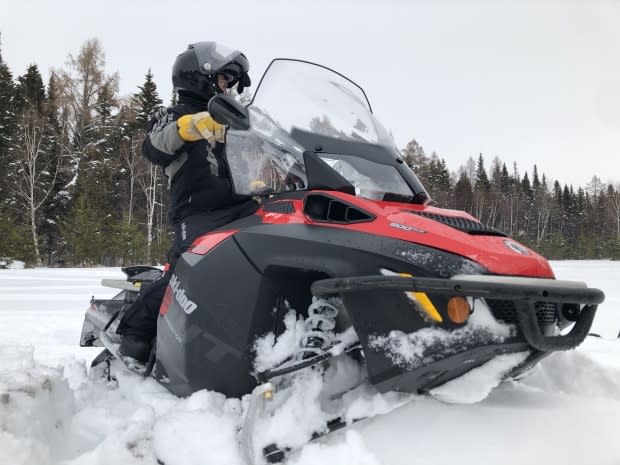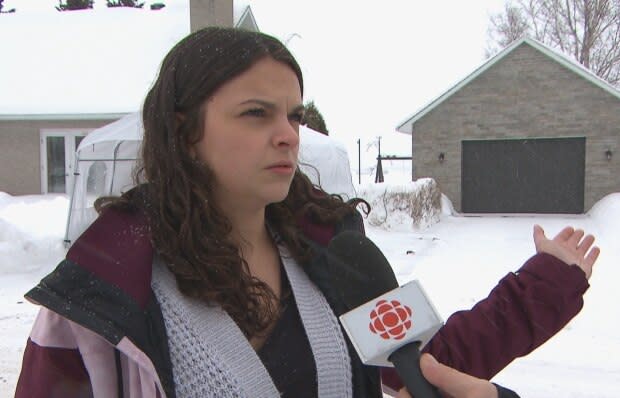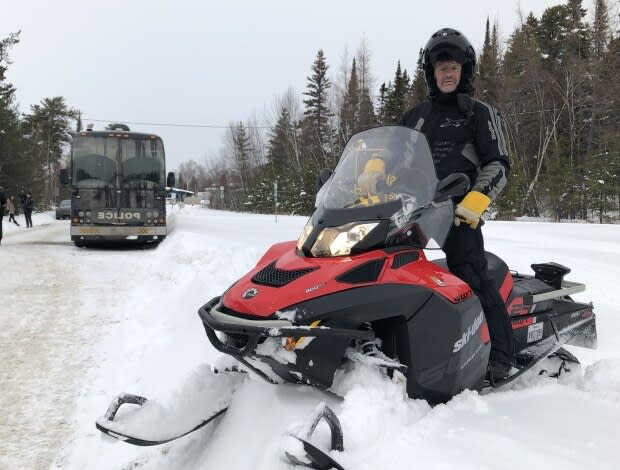Lac-Saint-Jean, 'mecca of snowmobiling,' coping with unprecedented tragedy
It's not uncommon for snowmobilers to call for help after losing their way in the maze of trails in Lac-Saint-Jean's back country, says Charles Tremblay, the president of the region's snowmobiling club.
But last Tuesday's 911 call was different.
"As soon as [first responders] understood where the group got lost, everything was put into motion very quickly," said Tremblay, speaking to a CBC reporter at his dépanneur in Saint-Henri-de-Taillon, 25 kilometres northwest of Alma, Que.
In a region where snowmobile trails nearly outnumber traditional roads, the incident has shaken the entire community.

It was here, at Tremblay's convenience store and gas station, located right on the interprovincial snowmobile trail, where three French tourists showed up Tuesday evening, desperate for help.
Two were soaking wet — their snowsuits frozen stiff.
"One of them was shaking violently," said Janie Lamothe, the 17-year-old clerk on duty. "It really wasn't pretty."
She dragged out an electric heater and blasted it, handing the men towels with which to dry themselves off.
The men told her one of their snowmobiles had crashed through the ice nearby. But they had no idea what had happened to their five fellow travellers or their guide.
Lamothe said the men told her the guide had turned back to check on them when he realized they were no longer following the group.
When he saw one of their machines had gone through the ice, he sped off to alert the others.
"They waited for about 30 minutes, but when the guide didn't come back they decided to go look for help. That's the last time they saw him."
Lamothe stayed with the men until a social worker came to pick them up. As with many others in this small town, she only found out the extent of the tragedy later, through social media.
'We know not to go there'

"I really don't understand how they ended up there," said Tremblay. Local snowmobilers know that the spot where the group was last seen, near a channel where the water drains away from Lac Saint-Jean, never freezes over completely.
"It's a place where there is a lot of current that should really be avoided."
Snowmobiles are allowed on certain sections of the lake during the winter, but only once officials have tested the thickness of the ice and have put up signs indicating it's safe.
Snowmobiler Denis Tremblay, who owns a fishing cabin on the lake, says he only drives on it in broad daylight — and never near the channel, known as La Grande-Décharge. "We know not to go there," he said, when he stopped by the command post set up by provincial police for their search and rescue operation.
Denis Tremblay is originally from Alma, but even he has lost his way on the lake.
"Last year I got caught in a storm, and if I hadn't had a GPS..." his voice trailed off as he looked out past the treeline, to the spot where the French tourists had veered off the main trail.

'It's a catastrophe': Alma's mayor
The snowmobile industry is omnipresent in this region: yellow-and-black road signs mark the snowmobile crossings every few kilometres on most roads.
People have gone through the ice before, said Alma Mayor Marc Asselin.
"Luckily, usually someone gets to them in time," he said.
But the outcome of Tuesday's incident — with the guide, 42-year-old Benoît Lespérance, and one of the tourists found dead, and another four men unaccounted for — is the worst incident the region has ever seen, according to Asselin.
"It's a catastrophe. So many snowmobilers — all at once — I've never seen anything like it, ever."

While Asselin himself isn't "a fan of the noise and the smell," he said, in Alma, passion for the sport runs deep.
"We're very close to nature here: people go hunting and fishing; the Innu community is also always out on the land — since they were invented, there have always been snowmobiles here."
He said workers and volunteers maintain the trails as diligently as they would any road or highway.
On Thursday, the regional tourism board temporarily pulled one of its ads promoting the sport, out of respect for the families of the missing and the dead.
While Asselin said he understands this tragedy may cast a shadow on the sport's image, he doesn't believe it will mar the sport's popularity.
It is the region's top winter attraction, with snowmobile enthusiasts booking 165,075 overnight stays in 2017, according to Tourisme Saguenay–Lac-Saint-Jean.
"It's the mecca of snowmobiling," said Asselin.
He has pledged to review how the tragedy could have been avoided.
"We don't want this to happen again — we will try to learn from this and see how we can improve security."



